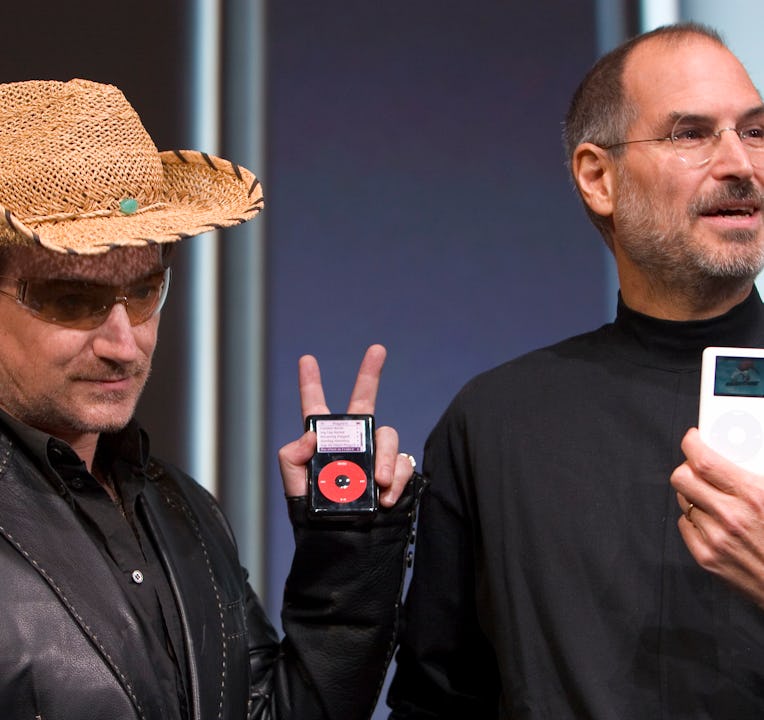The last iPod Classic rolled off the assembly line in September of 2014. About two years later, I stole one from my boss at a bookstore in Dumbo. It was a black fifth-generation model (the “iPod Video” technically) with a polycarbonate plastic front case, and it was sitting at the bottom of one large storage container in a stack of several that my boss kept in the back of the store. By that point, I’d had a standard silver sixth-generation Classic that I’d put my entire life on — music, podcasts, film commentaries, stand-up albums, demos from a band I was drumming for. It’s hard to stress how important my iPod was to my experience of living in New York, cramped, broke, fatigued, and not motivated to lug much else with me all from work to class to home. One day I cried on the subway when my iPod died, the prospect of a silent hour-long commute to Brooklyn too much for my 20-year-old soul to bear.
In any event, one boring afternoon at this job none of us were paid enough to care about, my coworkers and I rummaged through our boss’s crap in search of some tool, maybe a cord, or a flash drive. I found the iPod face down, seeing my boss’s name engraved on it. The thought that ran through my mind before I pocketed it was similar to the psychosis that led people to hoard toilet paper at the beginning of the pandemic: What if I run out? As in, what if my iPod smashes on the ground or is run over by a car, or, as eventually happened, simply fizzles out? I needed a backup, and a second, free device was there for the taking. Now, the iPod scarcity I was worried about has finally come around.
Earlier this week, Apple announced the discontinuation of the iPod line, surviving until now only through the iPod Touch, which happens to still be my main listening gadget. As of Wednesday, all available units have now been sold in the U.S. Apple Store. I still have both my Classics, but, due to a horrific, painful, and too-expensive-to-fix hard drive issue, my entire library of audio is relegated to my iPod Touch, where I can at least still download new music. Apple’s press release, wistfully titled “The music lives on,” ends with a reminder that you can buy their other products now.
The first iPod was introduced in 2001, after other companies like Samsung and Creative Lab had spent the late ’90s trying to manufacture MP3 players to compete with CDs. Though the first iPod, with its 5GB capacity and relatively sleek design, presented a paradigm shift for Apple, the wider shockwave to the music industry came with the introduction of the iTunes music store, enabling the convenient, specific, and, perhaps, most importantly for the record companies, legal purchase of whole albums or individual singles. What followed — those iconic white headphone commercials, the extreme exposure bands got by having their music featured as part of the iPod brand, the attendant third-party accessory markets, Apple’s immense wealth, and the general reconfiguration of the music industry from physical to digital media — hinges on many factors, but the iPod’s place in that context is essential.
To chart the personal usefulness or, god forbid, sentimental value of any obsolete technology is to risk sounding like a dork. Times change, efficiency comes for all that one might hold dear, and eventually people don’t remember what the fuss was all about. And, of course, it’s more than a little ironic to be nostalgic for a device that had a largely homogenizing effect on the culture. This is an Apple product, after all. But (“now more than ever”) there are so few of these tactile technologies left to mourn, ones that prove to be durable, portable, idiosyncratic, and relatively unbound by copyright law. Does Spotify have access to the treasure trove of untitled tracks by unnamed artists that I’ve had in my library for over a decade? Probably, but I don’t have to worry about them suddenly disappearing after a legal dispute, or losing access because I forgot my password, or paying a subscription fee to listen without commercials. I have even more gratitude for my iPod in a period when art is immediately available but blandly frictionless and more often than not tied to some form of surveillance.
This day was a long time coming, of course. For years now, new models of car, laptop, and phone have not even used the same USB cable I needed to charge and update my Classic. I hoarded cables, but not the adapters needed to make them work. Over the years, I held out hope for an iPod revival that has yet to come.
Now, we live in the wake of a culture-shifting artifact. The iPod was, in tandem with the Internet, Napster, and the etherealization of art, a bulldozer that irrevocably changed how music existed in daily life. There’s no telling what the future holds for the individual listener, what revivals and nostalgic reclamations will crop up. For now, the music listening experience has gotten a little more flat and uninspiring, marching onwards towards a world even more saturated with algorithmic recommendations and automated playlists.
At the end of middle school, I lost my Classic and moved on to a shitty Touch for years before I rediscovered it. When I charged it back to life, that iPod ran as smoothly as the day I took it out of the box, every song I had loved but forgotten about, initially dismissed but finally came around to, even ones I never remembered downloading, all still there, owned and mine.
